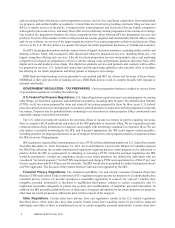HR Block 2013 Annual Report Download - page 20
Download and view the complete annual report
Please find page 20 of the 2013 HR Block annual report below. You can navigate through the pages in the report by either clicking on the pages listed below, or by using the keyword search tool below to find specific information within the annual report.H&R Block 2013 Form 10-K 13
bank holding companies. Pursuant to Supervisory Letter SR 11-11 (July 21, 2011), the Federal Reserve has directed
examiners to apply the principles of SR 09-4 to SLHCs. Pursuant to SR 09-4, we have committed to provide notice to
the Federal Reserve prior to paying dividends or repurchasing shares.
The Proposed Capital Rules would require our Holding Companies to retain significant additional capital, even
though HRB Bank has regulatory capital substantially above the “well capitalized” level. At this time, we do not foresee
regulatory flexibility in this regard in light of the Federal Reserve's views of the statutory requirements imposed under
the Dodd-Frank Act. Accordingly, while our current belief is that dividends at current levels would continue to be
permitted as long as HRB Bank remains well capitalized, the Federal Reserve will closely supervise and likely restrict
our other capital allocation decisions, including stock repurchases, acquisitions, and other forms of strategic investment.
As previously announced, we are in the process of evaluating alternative means of ceasing to be an SLHC, in which
case we would no longer be subject to regulation by the Federal Reserve as an SLHC. In connection with that evaluation,
we are exploring alternatives to continue delivering financial services and products to our customers.
Our evaluation of alternatives is ongoing and we cannot predict the timing, the circumstances, or the likelihood of
us ceasing to be regulated as an SLHC, or whether cessation of SLHC status would have a material adverse effect on
our business and our consolidated financial position, results of operations, and cash flows. If we are successful in our
efforts to cease being an SLHC, the means we use to deliver financial services and products to our customers will
change, and the revenues and profitability of those offerings could be adversely impacted.
HRB Bank is subject to extensive U.S. federal banking laws and regulations. If we fail to comply with
applicable banking laws and regulations, we could be subject to disciplinary actions, damages,
penalties or restrictions that could significantly harm our business.
HRB Bank is subject to regulation, examination, supervision, reporting requirements and enforcement by the OCC.
The OCC can, among other things, issue cease-and-desist orders, assess civil money penalties and remove bank directors,
officers or employees, for violations of banking laws and regulations or engaging in unsafe and unsound banking
practices.
HRB Bank is subject to OCC regulatory capital requirements. Failure to meet minimum capital requirements may
trigger actions by regulators that could have a direct, material effect on HRB Bank. HRB Bank must meet specific
capital guidelines involving quantitative measures of assets, liabilities and certain off-balance sheet items as calculated
under regulatory accounting practices. OCC regulations currently require HRB Bank to maintain minimum amounts
and ratios of tangible equity, total risk-based capital and Tier 1 capital.
The laws and regulations imposed by U.S. federal banking regulators generally involve restrictions and requirements
in connection with a variety of technical, specialized and expanding matters and concerns. For example, compliance
with anti-money laundering and know-your-customer requirements, and the Bank Secrecy Act, has taken on heightened
importance with regulators as a result of efforts to limit terrorism. There has been increased regulation with respect to
the protection of customer privacy and the need to secure sensitive customer information. Being subject to banking
regulation may put us at a disadvantage compared to our competitors which are not subject to such requirements.
The OCC could deem certain products offered by HRB Bank to be “unsafe and unsound” and require HRB Bank
to discontinue offering such products. To the extent such products are instrumental in attracting clients to our offices
for tax preparation services, we could experience a significant loss of clients should such products be discontinued.
This could cause our revenues or profitability to decline.
The Dodd-Frank Act created the CFPB to administer and enforce all U.S. federal consumer protection
laws and expanded the role of state regulators with respect to consumer protection laws. Regulations
promulgated by the CFPB or state regulators may affect our bank and financial services businesses
in ways we cannot predict, which may require changes to our financial products, services and
contracts.
The Dodd-Frank Act also created the CFPB with broad powers to administer and enforce all U.S. federal consumer
protection laws. The CFPB has broad rule-making authority for a wide range of consumer protection laws that apply
to all banks, federal savings banks, and other financial services companies, including the authority to prohibit “unfair,
deceptive or abusive” acts and practices. The CFPB has examination and enforcement authority over all banks with
more than $10 billion in assets. Banks with $10 billion or less in assets will continue to be examined for compliance
























